Maritime Agencies
Oyetola Opens LIMWEEK 2024, Harps On Port Efficiency and Safety
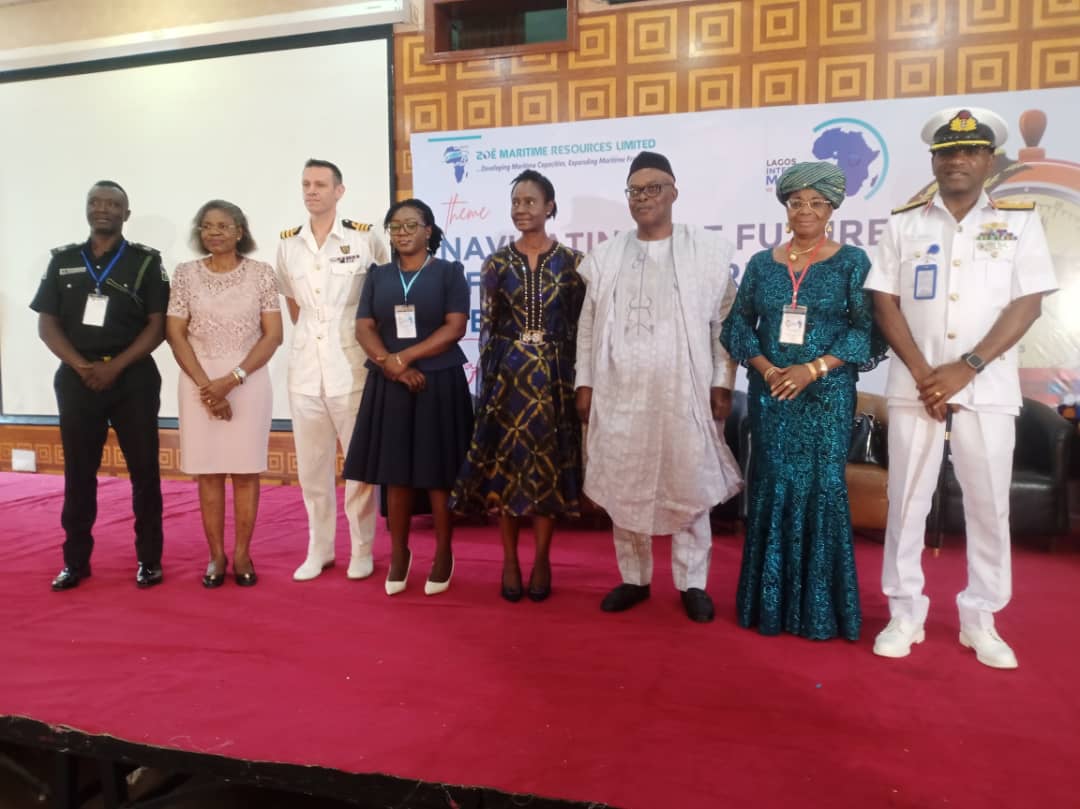
By Izuchukwu Ozoemena
Nigeria’s Marine and Blue Economy Minister, His Excellency Adegboyega Oyetola says in the maritime world, port efficiency and safety are critical components that can never be overlooked while discussing economic growth, trade and investment.
The Minister stated this in Lagos, Tuesday, while declaring open the 2024 edition of the Lagos International Maritime Week (LIMWEEK) and the Business To-Business Conference and Exhibition with the theme ‘Navigating the Future of Africa’s Marine & Blue Economy – Safety First.’
Improvement in safety and ports efficiency, he explained, top the chart on the responsibilities President Bola Tinubu handed to him to achieve as Minister.
The Minister, who was represented by Mr Chinedu Mbam, Legal Director in the Ministry, added that government was fully committed to drive the modernisation and improvement of the ports and maritime infrastructure.
By upgrading the nation’s ports to global standards, he noted, Nigeria will position herself to become a leader in international maritime trade since ports serve as gateway to prosperity.
“We understand that port efficiency and safety are not options; they are imperatives for unlocking the full potential of the blue economy. This is significant because safety remains the cornerstone upon which all maritime operations and business success rest.”
Through key safety initiatives such as the Deep Blue Project, he explained, Nigeria and, indeed the Gulf of Guinea, have achieved reasonable reduction in maritime crimes such as piracy, sea robbery and smuggling.
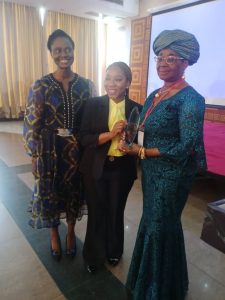
Mrs Sofiye Uzor (Centre) receiving the Award on behalf of Engr Greg Ogbeifun.
In his contribution, the Lagos Star Commissioner of Police acknowledged his responsibility to secure the maritime domain, including the intricate inland waterways crucial to Nigeria’s economy and Africa’s broader maritime sector. “The Gulf of Guinea, as many of us are aware of, is both a region rich in resources and a key artery for global maritime trade also faces persistent security challenges. The Nigeria Police, through its Maritime Command, has played a pivotal role in securing our maritime domain. Our mandate extends beyond merely patrolling the waterways. We work hand-in-hand with other national and international agencies to protect vital assets, combat piracy and ensure that our marine environment is safe and secure for all stakeholders.”
The Police boss who spoke through Chief Superintendent of Police Segun Falemara said as a matter of routine, the Police collaborates with NIMASA and other critical stakeholders in joint operations to reduce maritime crimes.
“The Marine Police deploys advanced surveillance techniques, leveraging human intelligence and technological solutions to monitor criminal activities along the waterways.”
“Through regional and international partnerships, we ensure our officers are well trained to address emerging maritime threats and security challenges.”
To achieve reasonable security in the Gulf of Guinea, he suggested a coordinated effort from the component littoral states and international partners.
Nigeria, he recalled, has been at the forefront of fostering regional collaboration to ensure a safer maritime environment.
“Some of these include the AGWE Project and the SWAIM SAR Project.” The AGWE Project anchored by the Interpol is a collaborative programme of five West African states aim at training, mentoring and providing equipment for boosting maritime security while SWAIM (Support to West African Integrated Maritime Security) have enhanced the search-and- rescue capabilities in the Gulf of Guinea.
“These initiatives have improved the region’s ability to swiftly respond to maritime emergencies and criminal activities, fostering safety on our waters”. He explained that the United Nations Office on Drugs and Crime has been invaluable in supporting Nigeria’s efforts to combat piracy and armed robbery at sea.
“Through UNODC, the Danish government has funded training programmes that have equipped our offices with Visit, Board, Search and Seizures (VIBSS) procedures in conjunction with the Nigerian Navy to combat illegal activities at sea.
On the proliferation of dangerous materials, he said that partnering with the International Atomic Energy Agency (IAEA) and the US International Counter-proliferation Programme, Nigeria has worked to prevent the smuggling of hazardous materials and weapons of mass destruction into the Gulf of Guinea. This is a critical step towards ensuring that the blue economy is not compromised by illicit activities that would have devastating environmental and security consequences.
The Suppression of Piracy and Other Maritime Offences Act, 2019, he said, has significantly strengthened Nigeria’s legal framework for tackling piracy and other maritime crimes. “It aligns our national laws with international frameworks and provide the necessary legal backing for prosecuting offenders in Nigeria.”
Through the Harmonized
Standard Operating Procedures (HSOPs), efforts are on to ensure that regional maritime security agencies adhere to harmonized SOPs, ensuring a “legal finish” in prosecuting maritime offenders.
Nigeria participates actively in national and regional maritime security conferences such as the Yaounde Architecture for Maritime Security which facilitates coordination between West and Central African states. Mentoring programmes including training supported by international partners such as the US and European Union have played a key role in improving Nigeria’s operational capabilities. “The Nigeria Police also contributes to the 2050 Africa’s Integrated Maritime Strategy (2050 AIM Strategy), comprehensive, concerted, coherent and coordinated approach that improve maritime conditions with respect to environmental and socio-economic development as well as the capacity to generate wealth from sustainable governance of Africa’s blue economy.”
The Police boss assured Nigeria’s commitment to the development of her blue economy through fostering safety and security across her maritime domain.
In his intervention from the perspective of the British Royal Navy, Commander Daniel Waskett, SO2 Marine, disclosed the UK strategy which is to establish long-term and mutually-beneficial partnerships with African nations to build on shared interests for safer, healthier and more prosperous future for all. However, like many nations committed to ensuring a free, secure global common maintenance of international rules-based order and supporting democracy, he stated, the UK is experiencing a time of increased operational demand the Royal Navy is deploying globally at a scale unprecedented for many years.
“Destroyers and Frigates are protecting shipping in the Red Sea to ensure trade can continue freely.”
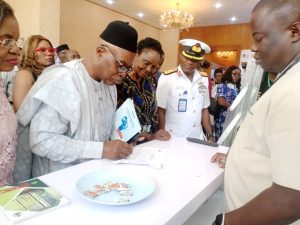
Highlight of the event, among others, was the conferment of a lifetime achievement award on Engr Greg Ogbeifun, Chairman, Starzs Marine and Engineering Co Ltd.
Maritime Agencies
MARAN Hosts Discussion on Nigeria-China Currency Swap Deal: Opportunities, Challenges
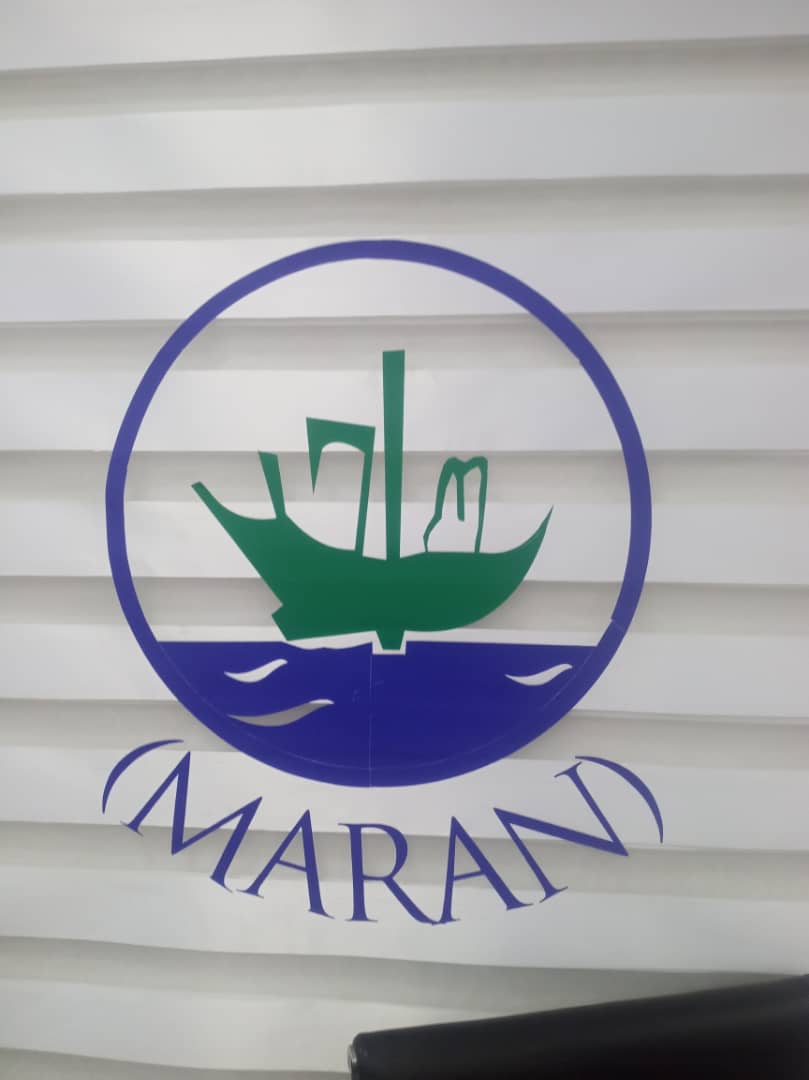
By Izuchukwu Ozoemena
Come April 15, 2025, the Maritime Reporters’ Association of Nigeria (MARAN) will play host to a top- flight event with the theme “Navigating the Nigeria-Peoples Republic Of China Currency Swap: Opportunities and Challenges for Import, Export and Maritime Business”.
The landmark event which takes place a the Rockview Hotel, Apapa GRA, Lagos, will bring together critical stakeholders in the import and export business, policy-makers, and government agencies to examine the Nigeria-China Currency Swap deal and the implications on Nigeria’s maritime industry.
The currency swap agreement, worth 15 billion Yuan ($2 billion), enables the direct exchange of the Chinese Yuan and the Nigerian naira, bypassing the US dollar.
This groundbreaking deal, according to Godfrey Bivbere, President of MARAN, is expected to foster stronger bilateral trade, between Nigeria and China by reducing transaction costs and boosting economic cooperation.
The MARAN President emphasized that in line with her role agenda-setting role, the association recognizes the importance of interrogating the policy further considering the debilitating effect of the American dollar on importation and China’s significant role as Nigeria’s biggest import partner.
Participants expected at the event include the Central Bank of Nigeria (CBN), the Nigeria-China Strategic Partnership (NCSP) and the Chinese Embassy in Nigeria.
Others are the Ministry of Finance, importers, exporters, maritime operators, policy-makers, economists, financial institutions, and trade organizations.
The event aims to provide an enhanced understanding of the Nigeria-Peoples Republic Of China currency swap and its impact on stakeholders in import, export, and maritime businesses.
The meeting will also identify potential risks and opportunities arising from China’s growing economic influence in Nigeria and provide actionable recommendations for stakeholders to navigate changes in the trade and maritime landscape.
Maritime Agencies
Zoe Maritime Breakfast Meeting: NCDMB, NIWA, LASWA Discuss Maritime Logistics, Sustainability of Ocean Economy.
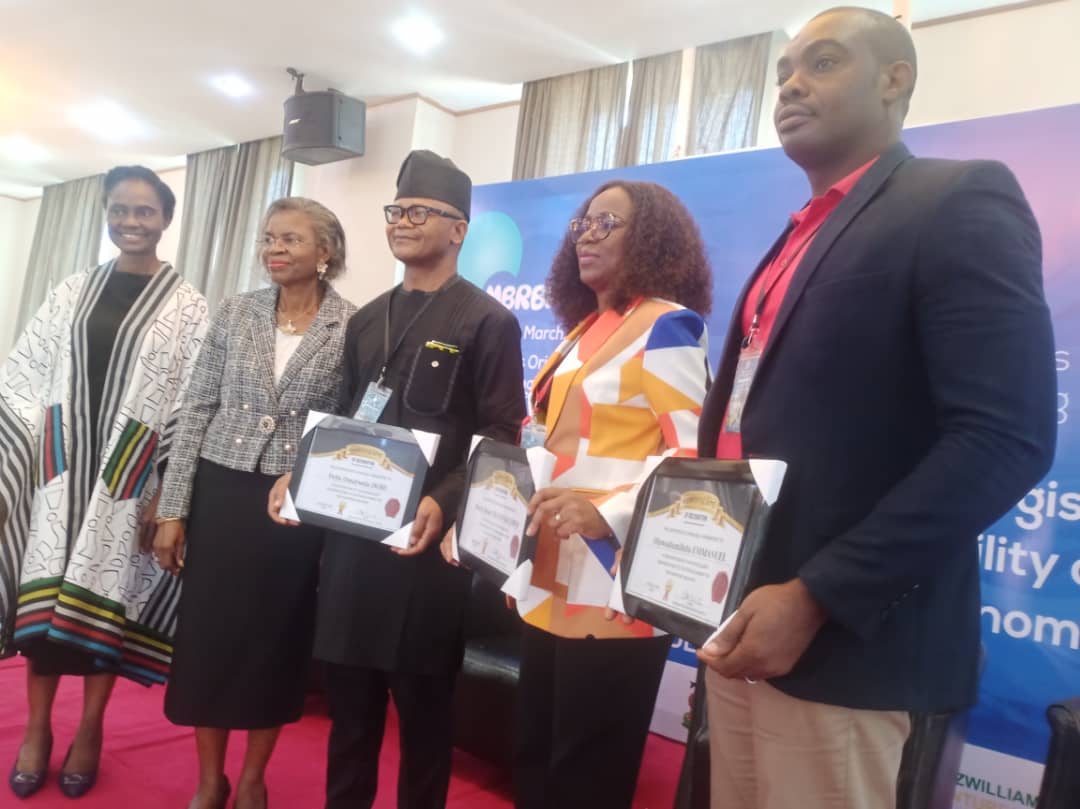
By Izuchukwu Ozoemena
In furtherance of a mandate to champion local human resources input into operations in Nigeria’s oil and gas sectors, the Nigerian Content Development and Monitoring Board (NCDMB) has instituted the Nigerian Content Forum
However, the agency’s intervention in the maritime space has been challenging as she struggles with in-country value addition and pushback in efforts to make progress.
NCDMB Executive Secretary/CEO, Mr Felix Omatsola Ogbe stated this in Lagos, Thursday, during a panel discussion at the 2025 edition of the Maritime Business Roundtable Breakfast Meeting organized by Zoe Maritime Resources Ltd with the theme ‘Maritime Logistics and Sustainability of the Ocean Economy’. Other dignitaries on the discussion included Oluwadamilola Emmanuel, General Manager, Lagos Waterways Authority (LASWA), Engr Elsie Egwuatu, Head of Marine, Lagos Area Office of the National Inland Waterways Authority (NIWA) and Ruth Ikem Chukwukezirim, CEO, Global Energy & Logistics.
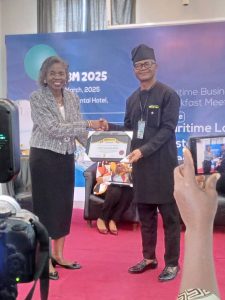
Mr Ajimijaye receiving a souvenir on behalf of NCDMB Executive Secretary/CEO.
Speaking through Silas Omomehin Ajimijaye, General Manager, Research, Statistics and Development, the NCDMB boss referred to the $350 million intervention fund up for grabs by local shipping companies. Not less than 10 Nigerian companies, he explained, have accessed the facility.
“As a matter of fact, before I came here, I was speaking with one of those companies that have benefitted from our intervention. A good example is Starzs Group. They said they are very happy with what NCDMB has done to help them as a as a company. I know the MD, Iro Ogbeifun, a lady who is doing so fantastically well. That is one of those cases we talk about women empowerment. The company is doing well. Not only them, there are several others we are working with to deepen in-country value addition in the maritime sector.”
The fund which keeps growing is disbursed as a single digit loan businesses use and pay back. “This fund is being managed by the Bank of Industry (BOI). Every now and then, they provide a report to show how it is going.”
On collaboration with other agencies, Mr Ajimijaye said part of NCDMB’s mandate is to collaborate with NIMASA to deepen local content through the Nigerian Content plan which should be enshrined into every contract arrangement.
“You have to state what Nigerian Content plan you have now and what you plan to do. Even with manning vessels, you have to show what you have currently and how you want Nigerians to understudy foreigners and possibly integrate them into the system.”
“There is what we call the baseline census for the marine services sector. What this means is that for the companies which are into marine services in the oil and gas sector, we want to do a census, a survey. What is the capacity, the capabilities? How many vessels do they have? Who are the Nigerians there? Who are the foreigners there? What are they doing and what are their challenges? When we analyse the data, we do what we call a gap analysis and have a clear data-driven scenario and recommend to government ways to bridge gaps.”
“We also recognize our partners – NIMASA, NIWA, various other institutions and industry players to collaborate to solve the problems.”
For instance, he explained, what NCDMB calls the Nigerian Content intervention fund is based on a study carried out to realize that people have financial challenges.”
The fund is given to a development bank to help NCDMB administer instead of leaving the money in the Central Bank.
On reducing joblessness among trained seafarers, the NCDMB boss explained that his agency’s intervention is a continuous process.
“For some of them, we do the training and try to source seatime places for them. It is a very big challenge to engage them on vessels for seatime experience. They have the training, certification and exposure. It’s been very fantastic but the problem is the size of the industry. Right now, you can’t take everybody. Entering the programme has always been very competitive. For those who have participated, you can rarely find anyone who has gone through that internship training roaming the streets. It’s only those who have not had the opportunity to have the exposure. The cadet internship training programme is a continuous process. Apart from cadets, we have training for marine surveyors. We give them scholarship. Thereafter, they’re expected to launch out into the world.”
NCDMB recommends that after training, the cadets are not expected to wait for the agency to engage them because it does not have the jobs.
“We are not a maritime company. We’re just to build and launch you to find work anywhere in the world.”
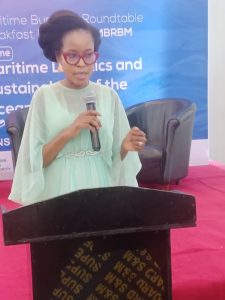
Engr Elsie Egwuatu, Head of Marine, NIWA, Lagos Office.
In a presentation, the National Inland Waterways Authority (NIWA), the statutory regulator of the inland waterways, outlined her critical role in promoting maritime logistics and the sustainability of the ocean economy by making operations on inland waterways safe and seamless. Represented by Engr Elsie Egwuatu, Head of Marine, NIWA, Lagos Office, the
agency dwelt on critical areas of concern currently including maritime accidents and safety, delays, disruptions and navigational challenges which are being tackled headlong with huge assistance from the Minister of Marine and Blue Economy, HE Adegboyega Oyetola.
NIWA, she stated, has also ensured the development of indigenous technical and managerial skills to meet the challenges of modern inland waterways transportation.
In her welcome address earlier, the Chair, Zoe Maritime Resources Ltd, Barr (Mrs) Oritsematosan Edodo-Emore said that as a coastal nation, it is important for Nigeria to harness ocean resources and develop her economy in a manner that sustains her teeming population while eradicating poverty in the land. Maritime logistics, she observed, is an acute driver of the ocean economy.
“In this digital age, it is important to evaluate how logistics is affecting the development of the ocean economy. What are our obligations in maritime logistics? What are the opportunities and how can these be harnessed to uplift the Nigerian populace and, by extension, develop the African continent?”
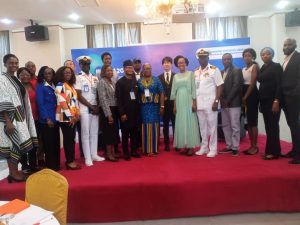
Other participants in the panel discussion included the representative of Oluwadamilola Emmanuel, General Manager, Lagos Waterways Authority (LASWA), the Nigerian Navy and Mrs Ruth Ikem Chukwukezirim, CEO, Global Energy and Logistics.
Maritime Agencies
‘OPERATION WHIRLWIND’: Customs Renews Commitment to Tackling Smuggling, Hauls Largest PMS Seizure in Kebbi.
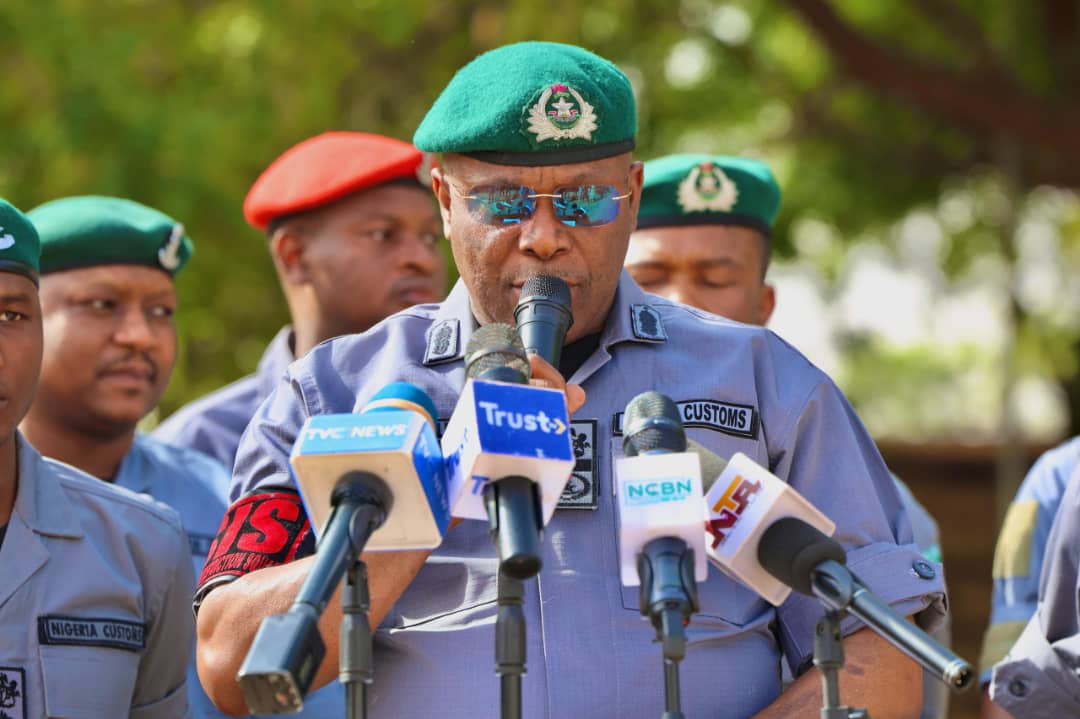
By Izuchukwu Ozoemena
Assistant Comptroller-General of Customs (ACG) Hussein Ejibunu, National Coordinator, ‘Operation Whirlwind’, a special task force of the Nigeria Customs Service on overcoming the menace of petroleum products smuggling, Tuesday, showcased what he described as the largest single seizure of smuggled Premium Motor Spirit (PMS) in Kebbi State since the operation was berthed.
Speaking at Birnin Kebbi, Kebbi State capital, Ejibunu who is also in charge of Financial Administration and Special Duties at the Customs Headquarters said the smuggling of PMS poses a serious threat to the Nigerian economy as it leads to revenue losses, distortion of trade statistics, artificial scarcity, and threats to national security.
The massive seizure, he announced, marks a significant milestone in the efforts of the Nigeria Customs Service (NCS) to protect Nigeria’s critical resources.
“The Nigeria Customs Service remains resolute in tackling smuggling activities that undermine government policies and economic stability,” ACG Ejibunu stated.
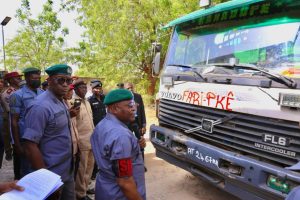
Items seized include 766 jerrycans of 25 litres each and 18 drums of 200 litres each of PMS conveyed in a Truck Plate number DC 7184 RB (Nigeria Plate Number) and 1,454 25-litre jerrycans and 18 200-litre drums of PMS loaded in a Truck number AT 2457 RUP (Republic of Benin plate.
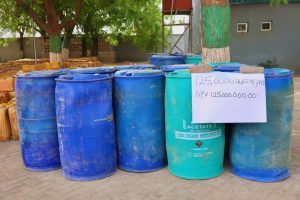
According to him, Truck number BV C240 Arubi—Republic of Benin plate number carrying 1,350 jerrycans, each 25 litres, and 18 drums, each 200 litres of PMS was also confiscated.
Additionally, 805 kegs of 25 litres of PMS seized at various flashpoints in the zone including Dole Kaina, Zaria Kalakala, Tunga Waterside, Lolo, and Tsamiya were also displayed.
The interception, which resulted from credible intelligence, occurred in the Tsamiya area of Kebbi State following days of painstaking surveillance.
Ejibunu who restated the determination of the NCS to sustain the fight against fuel smuggling said the Service is ever prepared to strengthen inter-agency collaboration so as to secure Nigeria’s borders.
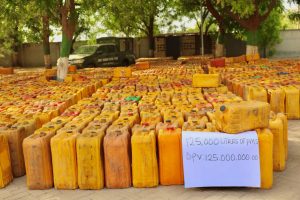
Kegs of confiscated PMS.
The seized PMS was sold at a controlled price of N10,000 per 25-litre jerrican to ensure that citizens rather than the smugglers themselves benefit.
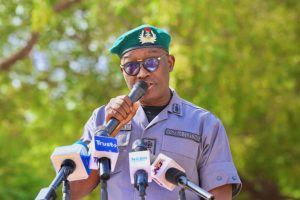
Chidi Nwokorie, CAC, Kebbi Command.
Addressing the press, Comptroller Chidi Nwokorie, the Customs Area Controller (CAC), Kebbi Command, reiterated his commitment to combat smuggling and other illicit trade activities in Kebbi State. He assured stakeholders of the Command’s determination to enforce trade regulations.
“We remain committed to facilitating trade and ensuring a seamless business environment for legitimate traders. For smugglers, our operations will only intensify to bring smuggling to its lowest possible level,” he pledged.
While recognizing how effective intelligence-driven operations can be, CAC Nwokorie commended the efforts of Customs officers in executing successful enforcement operations.
He also acknowledged the collaboration with sister agencies, highlighting their critical role in ongoing anti-smuggling initiatives.
“This success is a testament to the dedication and synergy between Customs and other security agencies. We will continue to work together to protect the nation’s economy,” Nwokorie added.
On his way back from Kebbi, ACG Ejibunu visited the Sokoto Customs Area Command, where he met with the Customs Area Controller, Sokoto-Zamfara Command, Comptroller Umar Abdulkadir and officers and men of the Service.
He used the opportunity to reaffirm the commitment of the Service to border security and the fight against smuggling.
-
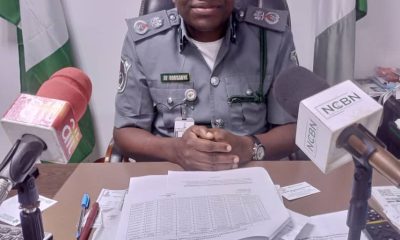
 Maritime Agencies2 weeks ago
Maritime Agencies2 weeks agoLilypond Export Command Is Meeting Expectations, Handles 70% of Nigeria’s Total Tonnage of Export Cargo, says CAC Odusanya.
-

 Personality Interviews3 weeks ago
Personality Interviews3 weeks agoTRADE FACILITATION: FULFIL CUSTOMS REQUIREMENTS, ENJOY AEO, B’ODOGWU, says Ayokunle.
-
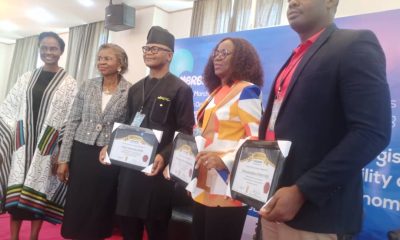
 Maritime Agencies4 days ago
Maritime Agencies4 days agoZoe Maritime Breakfast Meeting: NCDMB, NIWA, LASWA Discuss Maritime Logistics, Sustainability of Ocean Economy.
-
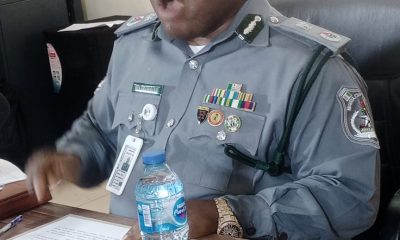
 Maritime Agencies3 weeks ago
Maritime Agencies3 weeks agoSEME CUSTOMS: Dr Oramalugo Dares Smugglers, Seizes N267m Illicit Drugs, PMS, Rice In A Month
-

 Maritime Agencies1 week ago
Maritime Agencies1 week agoANTI-SMUGGLING: Kebbi Customs Generates N13.3M In A Month, Confiscates Contrabands Worth N84.2 M.
-
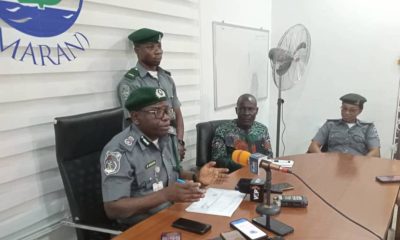
 Maritime Agencies3 weeks ago
Maritime Agencies3 weeks agoCustoms Export Command Seeks Seamless Movement To Ports To Evacuate Export Containers
-
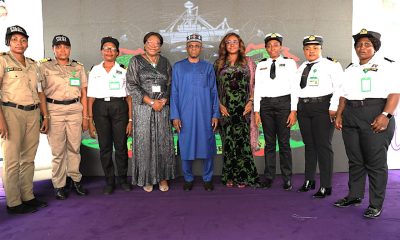
 Maritime Agencies3 weeks ago
Maritime Agencies3 weeks agoINTERNATIONAL WOMEN’S DAY, 2025: NPA Pledges Equal Rights For Women In the Workplace.
-

 Maritime Agencies1 week ago
Maritime Agencies1 week agoPorts Commissioner of Police Commends Bivbere-led MARAN for Responsible Reportage of Maritime Sector


























